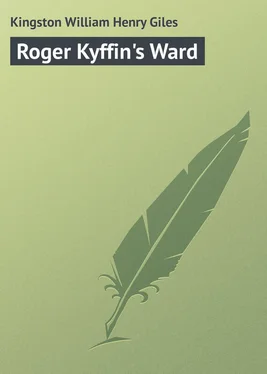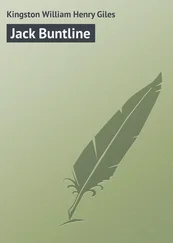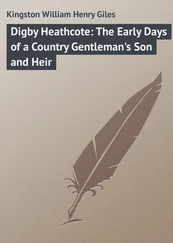William Kingston - Roger Kyffin's Ward
Здесь есть возможность читать онлайн «William Kingston - Roger Kyffin's Ward» — ознакомительный отрывок электронной книги совершенно бесплатно, а после прочтения отрывка купить полную версию. В некоторых случаях можно слушать аудио, скачать через торрент в формате fb2 и присутствует краткое содержание. Издательство: Иностранный паблик, Жанр: foreign_prose, foreign_children, на английском языке. Описание произведения, (предисловие) а так же отзывы посетителей доступны на портале библиотеки ЛибКат.
- Название:Roger Kyffin's Ward
- Автор:
- Издательство:Иностранный паблик
- Жанр:
- Год:неизвестен
- ISBN:нет данных
- Рейтинг книги:5 / 5. Голосов: 1
-
Избранное:Добавить в избранное
- Отзывы:
-
Ваша оценка:
- 100
- 1
- 2
- 3
- 4
- 5
Roger Kyffin's Ward: краткое содержание, описание и аннотация
Предлагаем к чтению аннотацию, описание, краткое содержание или предисловие (зависит от того, что написал сам автор книги «Roger Kyffin's Ward»). Если вы не нашли необходимую информацию о книге — напишите в комментариях, мы постараемся отыскать её.
Roger Kyffin's Ward — читать онлайн ознакомительный отрывок
Ниже представлен текст книги, разбитый по страницам. Система сохранения места последней прочитанной страницы, позволяет с удобством читать онлайн бесплатно книгу «Roger Kyffin's Ward», без необходимости каждый раз заново искать на чём Вы остановились. Поставьте закладку, и сможете в любой момент перейти на страницу, на которой закончили чтение.
Интервал:
Закладка:
“Do you think that Cochut will have time to prepare a breakfast?” asked the Colonel, looking at his sister. “We must send for him at once to receive his orders. Baron, we must leave the bands of the regiments to you. Harry, you must arrange with Mr Savage, the sail-maker, for the tents.”
“Now, recollect you two young men are to devote all your time and energies to these objects,” said Madam Everard, looking at them with a meaning glance.
“I must see you both in my study before you leave,” said the Colonel, “and now, lads, go to breakfast.”
The two young men looked at each other, and possibly suspected that the Colonel might, by some wonderful means, have heard of their quarrel.
Chapter Six.
Royal Visitors. – The King and the Mace-Bearer. – The Foes reconciled
The news of the good King’s intended visit to Stanmore Park was soon spread abroad. The mayor and burgesses of Lynderton resolved that they would request his Majesty to honour their borough by stopping on his way at their town-hall. The whole place was speedily in a state of the most intense commotion. While the Colonel and his womankind were making all the necessary preparations at the park, the lieges of Lynderton were engaged in the erection of triumphal arches, with a collection of banners of all sorts of devices, painting signboards and shop-fronts, and the polishing up of military accoutrements.
Lynderton was got into order for the reception of royalty even before Stanmore Park had been prepared. One chief reason was that there were many more hands in the town to undertake the work, and another was, there was less work to be done. The great difficulty was to have the band playing at both places at once.
Colonel Everard had already engaged them, and they could not on any account disappoint him. Still for the honour of Lynderton it was necessary that a musical welcome should be wafted to the King as he entered the precincts of the borough. At last it was arranged that a part of the foreign band should remain in the town to welcome the King, and then set off at a double-quick march to Stanmore, to be in readiness to receive him there.
The eventful morning at length arrived. It broke, however, with a threatening aspect. There were clouds in the sky, which looked more inclined to gather than disperse. Jacob Tuttle, who met Harry on his way to Stanmore, where he was to finish getting the tents in order, told him that it would be a rainy day. Madam Everard was in a state of greater anxiety than any one else; indeed, she had many things to trouble her. She was not sure that Monsieur Cochut would have performed his work to her satisfaction. Then there were so many mouths to feed, besides the King and his attendants, that she was afraid there might not be sufficient provisions for them. The tents were already erected. Harry had performed his part in a most satisfactory manner. She had no doubt the Baron de Ruvigny would arrange the band.
Not only was the King expected, but good Queen Charlotte and one or two of the princesses had expressed their intention of driving over to Stanmore. A few select guests had been invited to meet them. Among others was Lady Tryon. There were also General Perkins and his wife, and the well-known couple, Sir James and Lady Wallace. The General and the Admiral were old friends, and older enemies, for they had met as lads, when one was lieutenant of marines, and the other a midshipman, and had actually fought a duel, at a time when that foolish and wicked custom was in vogue even among youths.
(The writer thinks it well at this point to state that the Royal visit actually took place as described; also that the main facts and characters in the story are taken from an unpublished diary of the time, in possession of a member of the family.)
The great mass of the neighbourhood were invited to the grounds. All the arrangements were reported complete; but Madam Everard kept looking up anxiously at the sky, which threatened every instant to send down its waters upon the earth. The clouds gathered closer and closer, and some time before the hour at which the royal family were expected to arrive the rain began to descend. It was melancholy to look at the tents growing darker and darker as the water poured down on them, and to see the flags which should have been blowing out joyfully drooping on the flagposts. The rain pattered against the window panes, and the air blew in with a damp feel, which gave promise of a drenching day. Madam Everard became very unhappy; even the young ladies lost their spirits. The Colonel was the only person who seemed unconcerned.
“I have done my best,” he observed, “and there is no man more ready to make allowance than the King, God bless him.” The Colonel had been page to George the Second, and had been attached to the court of the present King, and knew him well, and, moreover, his many trials and difficulties. ”‘Uneasy is the head that wears a crown.’ Our good King finds it so, and few of his subjects have greater domestic as well as public trials to go through.”
Harry Tryon had been very busy and highly flattered by the confidence which the Colonel and Madam Everard had placed in him. Whether or not he still contemplated fighting the Baron de Ruvigny cannot now be said.
Seeing Madam Everard’s anxiety, he offered in spite of the rain to mount a horse and gallop off to ascertain whether the royal party were coming or not. His offer was accepted, and he was soon galloping away through the street of Lynderton on the high road to Lyndhurst, by which it was expected the King would come. He met on his way an open carriage and four horses, full, as it seemed to him, of old women wrapped up in red cloaks and hoods, such as were worn by the peasantry. He had got to the turnpike kept by an old woman, Mammy Pocock by name, when he inquired whether the royal family had come by.
“Why, bless you, yes; that be they,” said the old woman, pointing along the road. “They stayed in here ever so long, but at last they thought Madam Everard would be waiting for them, and so they borrowed my cloak, and they sent out, and borrowed as many cloaks and shawls as could be found in all the cottages near. It was curious to see the Queen and princesses laughing as they put them on.”
Harry was going to hurry back with the news, when he saw a party of four or five horsemen coming along the road. By this time the rain had somewhat ceased. He drew up on one side to see who the strangers were. He had little difficulty in recognising in the old gentleman who rode first with his coat buttoned up, but without any great coat, the King of England. Sir George Rose and two or three other gentlemen accompanied his Majesty. One of them, apparently, was urging him to stop at the tollgate, and dry his clothes.
“A little wet won’t hurt a man! a little wet won’t hurt a man!” answered the King. “The sun will soon come out, and answer the purpose better than a fire.”
As Harry knew that the Queen would arrive at Stanmore before he could get there, and that the King would be delayed for some time at Lynderton he followed the cavalcade at a respectful distance.
As they reached the entrance of the town the rain altogether ceased, and the sun shone forth, and shouts of welcome rent the air, and the band played a joyous tune, and the Mayor and the whole corporation in state came forth to welcome his Majesty, and to accompany him to the entrance of the town-hall. He there was ushered up, and led to a seat at the farther end, where he graciously received an address from the mayor, who, with the members of the corporation, were formally introduced.
Conspicuous at the other end of the room was a gaunt personage in scarlet robes trimmed with yellow fringe, bearing in his hand an enormous gilt club, so it looked.
Читать дальшеИнтервал:
Закладка:
Похожие книги на «Roger Kyffin's Ward»
Представляем Вашему вниманию похожие книги на «Roger Kyffin's Ward» списком для выбора. Мы отобрали схожую по названию и смыслу литературу в надежде предоставить читателям больше вариантов отыскать новые, интересные, ещё непрочитанные произведения.
Обсуждение, отзывы о книге «Roger Kyffin's Ward» и просто собственные мнения читателей. Оставьте ваши комментарии, напишите, что Вы думаете о произведении, его смысле или главных героях. Укажите что конкретно понравилось, а что нет, и почему Вы так считаете.












